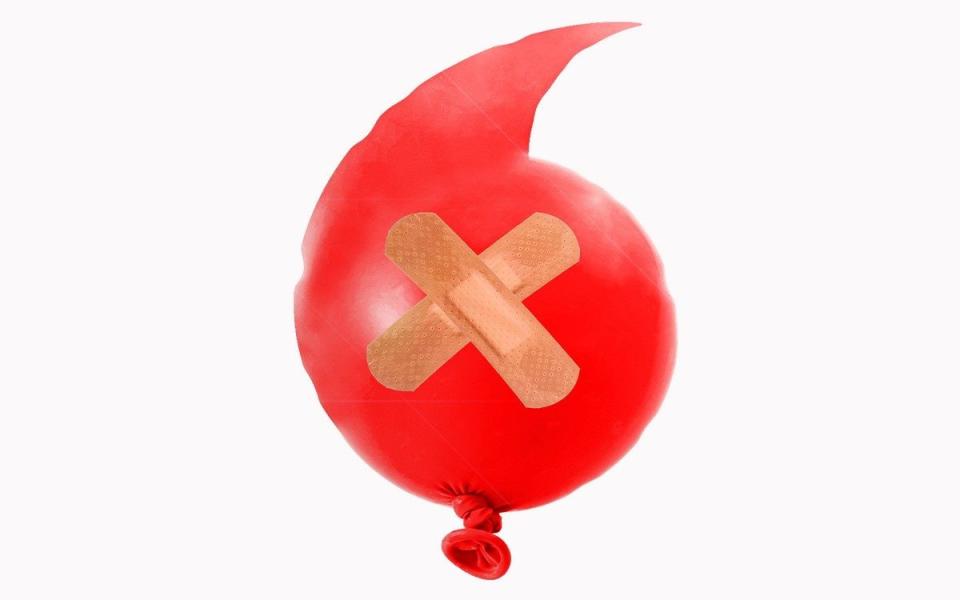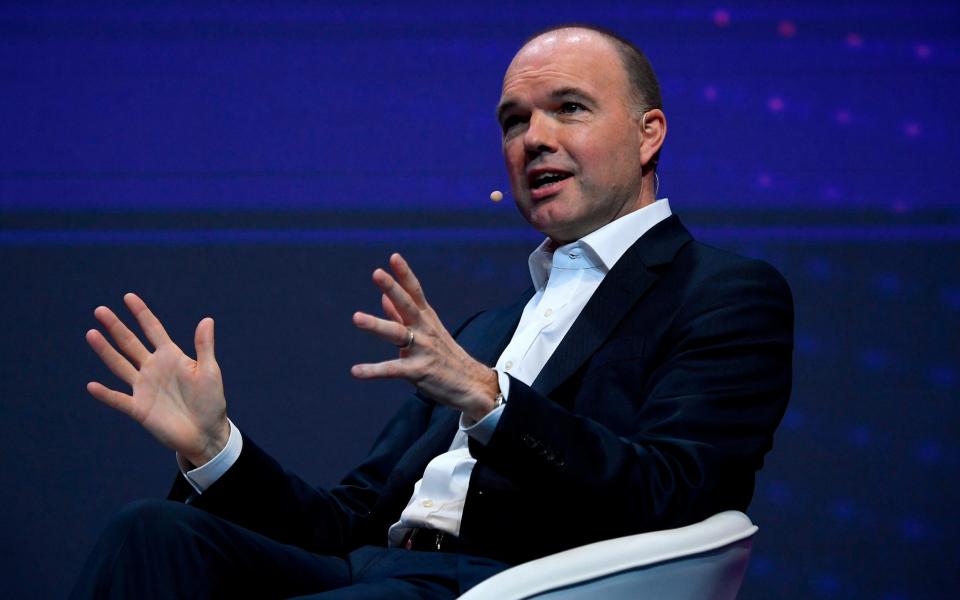The decline of Vodafone – and what’s really gone wrong

Vodafone chief Margherita Della Valle has admitted the struggling telecoms giant “must change” as she announced plans to cut 11,000 jobs and improve customer service.
The telecoms company, which employs around 90,000 people around the world, declined to say how many jobs would be lost in Britain but the sweeping job cuts will hit the UK.
Della Valle announced the turnaround plan alongside the frank admission: “Our performance has not been good enough.”
The company reported a 1.3pc drop in full-year earnings to €14.7bn, which it blamed on high energy costs and continued underperformance in Germany.
Revenues stagnated at €45.7bn (£39.8bn), with growth in Africa and higher equipment sales offset by lower service revenue in Europe.
The lacklustre results and turnaround pledge failed to impress investors, with shares slumping as much as 9pc to a level not seen since 1997.
It is a far cry from the company’s peak in 2000, when its share price was at an all-time high after a run of deal making in the 1990s. That year Vodafone also became a shirt sponsor of Premier League winners Manchester United.
However, Vodafone in 2023 looks like a “bloated” organisation to observers that is struggling to work out what its purpose is. Critics say it is trying to do too much in too many countries – a jack of all trades and master of none.
Karen Egan, head of mobile at Enders Analysis, says: “There’s a real question mark about where Vodafone adds value here, or does it detract value? The very essence of why Vodafone exists has to be called into question now.”
Della Valle, who was confirmed as permanent chief executive earlier this month after five months as interim boss, faces an uphill battle to revive the ailing telecoms giant after years of decline.

Once one of the world’s largest telecoms companies, Vodafone has struggled to halt a precipitous decline that has seen its share price slump by almost 60pc over the last five years.
Many of Vodafone’s current woes can be traced back to its disastrous €18.4bn acquisition of Liberty Global’s cable network in Germany. The 2019 deal still weighs on its bottom line: Vodafone posted a decline in service revenues in Germany last year and racked up more losses for TV and broadband customers.
Issues came to a head in December, when chief executive Nick Read was abruptly ousted under pressure from activist investors.
Della Valle, who has been at the company for almost three decades and most recently served as chief financial officer, was named interim chief executive and ultimately appointed to the top job this month.
But that came only after a protracted search process, during which Vodafone approached industry heavyweights including former EE chief executives Olaf Swantee and Marc Allera, who is widely tipped to take over at BT.
Internal country managers, who were initially excluded, were asked to apply late on in the process – a move that will further fuel speculation that Vodafone was struggling to attract a candidate.
Insiders said Della Valle’s deep experience at the company, as well as her European outlook, impressed the board and made her well suited to the role. She is also well regarded within the industry.
However, the choice of an internal candidate has raised eyebrows at a time when fundamental reform is needed. Della Valle’s concession that recent changes have been “too incremental” will be of little comfort given she was one of the most senior leaders at the company.
“People have been burned,” says Egan. “There have been many promises of a turnaround, but it just didn’t come to fruition.”
Shareholders and analysts are also concerned about the sustainability of Vodafone’s dividend. The company forecast free cash flow of just €3.3bn in the coming financial year, down from €4.8bn in 2023 and below expectations. With dividends of €2.5bn, plus additional costs for restructuring, this leaves little financial headroom.
Alongside mass redundancies, the new chief executive wants to refocus on Vodafone’s business division, as well as putting greater emphasis on customer service.

Philip Carse, chief analyst at Megabuyte, says prioritising the business division “makes sense” and that job cuts will help to streamline the “incredibly bloated” organisation.
To other analysts, however, Della Valle’s pledges are mere tinkering and more fundamental reforms are essential.
“The concern here is this sounds a lot like another one of Nick Read’s promises,” says Egan. “It needs to sound like there’s more conviction and more urgency behind it.”
Luigi Bucci, an analyst at Moody’s, agrees that “bigger change is needed”.
The most obvious solution is to focus on only key areas and build significant scale. Key to this is shedding businesses and divisions not seen as crucial.
Read got the ball rolling through the sale of Vodafone’s stake in its mobile mast business Vantage Towers, while in January the group sold its operations in Hungary for €1.7bn.
Della Valle announced a strategic review of the company’s operations in Spain, which could lead to a sale, while other markets such as Italy are ripe for consolidation.
She said: “My priorities are customers, simplicity and growth. We will simplify our organisation, cutting out complexity to regain our competitiveness.”
One industry source describes a break up of Vodafone as a “certainty”, while Carse says attempts to slim down the group are a “reflection of the fact that being a large telco cross-border doesn’t actually give you a lot of synergies”.
Instead, the Newbury-based business is doubling down on its home market of Britain.
Yet Vodafone’s biggest merger – a £15bn tie-up with Three that would create the country’s biggest mobile network operator – is still yet to materialise. Talks have been held up by leadership changes, disagreements over price and national security concerns.
Moreover, Della Valle could face a further stumbling block in the form of e&, the United Arab Emirates’ state-owned telecoms group that has built up a 14.6pc stake in Vodafone and taken a seat on the board.
e&’s assertion that its investment is based on Vodafone’s “established position and worldwide reputation” has fuelled speculation that it could be opposed to a break-up.
“Keeping the whole group together suits them,” says Egan. “I think that the likelihood of any of the individual markets being sold off to private equity will not appeal to e& but may be in the best interests of shareholders.”
With performance floundering and a new shareholder on her tail, Della Valle must demonstrate tangible results from her new plan fast.
As Carse puts it: “The onus is on her to prove that the strategy is going to work.”

 Yahoo Finance
Yahoo Finance 